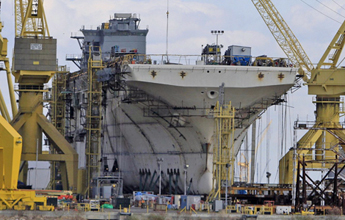Federal Budget Impasse Forces Immediate Navy Job Cuts
February 21, 2013
 |
| The USS America under construction at the Huntington Ingalls Industries shipyard in Pascagoula, Miss. Workers at shipyards across the country face layoffs from Navy cuts due to the budget impasse in Congress. |
The Department of Defense is sending out dozens of contract cancellations and preparing to lay off ten, possibly hundreds of thousands of workers because they can no longer fund projects started after 2009, due to the inability of Congress to pass a budget.
Ron Ault, President of the Metal Trades Department of the AFL-CIO, of which the IBEW is a member said:
Congress can’t pass a budget, so we irreparably compromise our fleet readiness and lay off hundreds of thousands of people. We won’t be able to support our troops or honor our agreements to our allies.
Most attention on Capitol Hill is focused on the automatic cuts that go into effect on March 1 if Congress does not pass a budget, known as sequestration. For the Navy, this would mean the loss of $4.6 billion, but the layoffs and contract cancelations going into effect now are not because of sequestration. They are happening because Congress has not passed a full budget since 2009, relying instead on continuing resolutions, bills that simply extend the previous year’s funding levels.
For the Navy, this is a double whammy because without a new budget, they will, under the terms of the latest continuing resolution, not be able to fund vital projects.
On Feb 15, the Navy began the process of shutting down anything that wasn’t authorized by the 2009 budget. Up to 46,000 defense civilian employees will be laid off. Contracts worth more than $600 million to repair and modernize 23 warships will be canceled and construction of some new vessels is being deferred or canceled.
William “Chico” McGill, Director of the Government Employees Department said:
More than 80,000 union members work in the affected shipyards, including thousands of IBEW members. When you add in the supply chain, several hundred thousand people are facing immediate layoffs and anyone who says they know when they’ll be back is lying to you.
If the sequestration cuts come into effect, a total of 800,000 civilian employees across the federal government will lose 20 percent of their income for 22 weeks through forced furloughs. Worse, Ault said, is that these cuts don’t save any money.
Ault said:
Once you cancel the [repair work] they can’t just get back in line. We are at full capacity in the shipyards for the next 10 years already. So, either the maintenance will be done later at much greater expense to the American people, or the Navy will have to retire ships from our fleet earlier than planned.
On Feb 6, the Navy took the unprecedented step of canceling the deployment of the USS Harry Truman carrier strike group to the Persian Gulf, leaving only a single carrier strike group in that region for the first time in decades.
With the deadline looming, an unprecedented coalition of unions affiliated with the Metal Trades Department of the AFL-CIO and the maritime industry businesses affiliated with the Shipbuilding Council of America took to Capitol Hill together to urge lawmakers to fix the problem.
The mostly non-union SCA and the union movement spoke with one voice on this, Ault said. What they found were lawmakers who had no idea this was even a problem.
Ault said:
We kept trying to convince Congress that this will unconscionably degrade our readiness. Never did anyone disagree with our conclusions or our facts. They just pointed their fingers at someone else and said, ‘We don’t have a solution.’
McGill, too, came away pessimistic.
No one prepared for this. Not on the Hill not at the Pentagon, because no one believed that the Congress --elected by the people-- would let this happen. The outcome for the union and the impact on communities around the country will be like the meteor hitting Russia.
Navy Actions due shortfalls in the Continuing Resolution:
- Cancel 10 ships maintenance contracts in San Diego, 10 in Norfolk, 1 in New London, 1 in Washington, 1 in Mayport.
- Cancel 3rdand 4thquarter aircraft maintenance in San Diego, Norfolk, Jacksonville, Whidbey Island, Lemoore, and Cherry Point.
- Cut 1,121 Temporary workers mostly in shipyards and base operating support.
- Cancel 30 building demolition projects
- Delay decommissioning and/ or disposal prep
- Implement civilian hiring freeze
- Defer new military construction projects
- Defer construction of aircraft carrier USS John F. Kennedy
- Cancel construction of one new Arleigh Burke-class guided missile destroyer.
Economic Impacts:
- Up to 46,000 Department of Defense civilian employees will be immediately laid off
- Another 800,000 workers will face furlough days resulting in a 20 percent pay cut
- More than 100,000 people could lose jobs in the shipbuilding and repair industry and our supply chain.
- 800,000 civilian employees will face as many as 22 furlough days, closing our shipyards one day a week until September 2013. These employees will see a 20 percent reduction in their
- Economists believe as many as one million jobs will be directly or indirectly lost should Congress fail to pass a defense budget.
- Another continuing resolution will result in additional ships being decommissioned or deferrals of new Navy ship construction programs and the accompanying loss of as many as 100,000 jobs in shipbuilding and the supply chain.
- Middle East deployed carrier presence reduced to 1 by mid-FY14
- The Navy is canceling 23 ships scheduled for repair and modernization already contracted as well as overhauls and scheduled dry-docking because the old continuing resolutions cannot fund them. Our readiness as a military force is being systematically degraded by continuing resolutions and the threat of sequestration.
See a full list the impacts of the continuing resolution and, should it happen, sequestration, at the website of the Metal Trades Department, AFL-CIO http://metaltrades.org/index.cfm?zone=/unionactive/view_article.cfm&HomeID=271767

|
